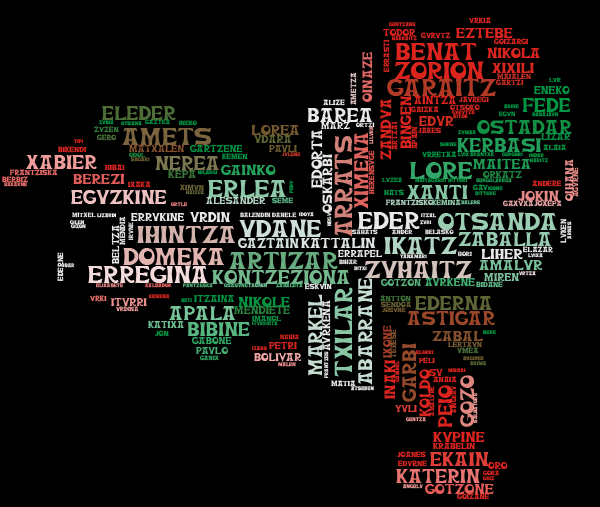I’ve delved into my genealogy a bit, scouring the priests’ books that document births, deaths, and marriages in each little town. Going back centuries, the names are all too familiar: Pedro, Jose, Domingo, Juan for the men; Josefa, Maria, Manuela, Magdalena for the women. Once in a while, there will be a Bartolome, or an Agustina, but what they all have in common is their Spanish origin. However, if you go to the Basque Country today, you’ll find a much wider variety of names with a much more exotic sound, names like Aritz, Endika, Iratxe, Eneritz, Egoitz. The history of simply naming people in Basque has a long and complicated history.
- The dominance of Catholicism in the Basque Country, on both sides of the border, meant that it was inconceivable to give children names that weren’t from a Saint. Further, these names were in the dominant language, Pedro on the Spanish side and Pierre on the French side.
- It wasn’t until the late 1800s, and in particular with Sabino Arana Goiri’s attempt to create Basque versions of the Saints’ names (Iñaki, Joseba, Josune, Koldobika, Kepa) and the rising nationalist sentiment, that Basque names became popular. The Church strongly opposed the use of such names, as they weren’t in the official languages. When Franco became dictator, he furthered such policies, to the point of erasing Basque names from cemeteries. It wasn’t until the 1970s, just before Franco died, that some historical Basque names like Oier, Gartxot, Tibalt, and Oneka were allowed.
- Not much is known about Basque names before Christianity entered the picture or before contact with the Romans, but inscriptions in Aquitanian give some hints. Some names are directly related to kinship, such as Cison (Basque gizon “man”), Andere (Basque and(e)re “lady, woman”), Nescato (Basque neskato “girl”). Another set related to animals — Harsi (Basque (h)artz “bear”), Osson, Oxson “wolf” — or other “natural” inspiration: Bihoxus (Basque bi(h)otz “heart”; Arixo (Basque (h)aritz “oak, tree”), Artehe (Basque art(h)e “oak”).
- Similar trends continued into the Middle Ages, but with much greater documentation. Thus, we know of names such as Affostar (native of Affos), Ame (mother), Anderezu (young lady), Andregoto (Mrs. Goto), Apalla (humble), Arzeiz (son of the bear), Beila (crow), Beltza (the Black), Beraza (the Soft), Eita (father), Gaisto (bad), Hobe (the best), Harze (bear), Launso (young man), Monnio (hill), Nequeti (tired), Ochanda (the she-wolf), Ona (the good one), Oria (the yellow one), Ozoa (the wolf, otsoa), Salduna (knight), Samurco (little tender), Seibelze (black vulture), Velasco (little raven).
- The Middle Ages also provide us with a long list of nicknames in Basque. These include Beltza “The Black”; Zuria “The White”; Azeari “The Fox”; Begichipia “Little Eye, Little Eyes”; Begi-ederra “Beautiful Eye”; Mari Ederra “Mari the Beautiful”; Martino Chipia “Martino the Little One”; Ochanda “The Big She-Wolf”; Salduna “Knight”; Seibelze “Black Vulture”; Pedro Sendoa “Pedro el Robust”; Gaisto “Bad”; Obego “The Best”.
- One last interesting note. One Basque name has become popular world-wide: Javier. It’s popularity is due to Saint Francis of Xavier, Xavier being where he was born. Xavier itself comes from the Basque words etxe and berri, meaning new house.
This Basque Fact of the Week inspired by a question from Ray Baehr. Thanks Ray!
Primary sources: Auñamendi Entziklopedia. Nombre. Available at: http://aunamendi.eusko-ikaskuntza.eus/es/nombre/ar-98475/; Auñamendi Entziklopedia. Antroponimia. Available at: http://aunamendi.eusko-ikaskuntza.eus/es/antroponimia/ar-1301/
Discover more from Buber's Basque Page
Subscribe to get the latest posts sent to your email.



Been reading you since you first got started back when I lived in San Jose. Now home again in Boise. Do you know the meaning of the name Belaustigue?
Kaixo Inez! Thank you for being such a long time follower! And, welcome home too Boise. 🙂
Unfortunately, Belaustigue wasn’t one of the names we got to when we were doing our surname lookup service. So, at this time, I think your best bet would be to ask at the Basque Genealogy group. They have a bunch of helpful people that I think could help you out.
You can find some info about them here:
https://buber.net/Basque/2019/12/24/basque-genealogy-is-moving/